
MONUMENTS AND CHURCHES
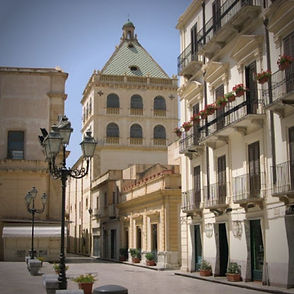
COMPLESSO SAN PIETRO
The complex occupies a large area inserted in the historical fabric of the city and overlooks streets XI Maggio, d'Anna and Ludovico Anselmi Correale. From the Epistles of Pope St. Gregory the Great addressed to St. Adeodata it is deduced that the Monastery of St. Peter has very distant origins in time, attributable to the sixth century, when the Marsala noble Adeodata had the Monastery built at her own expense on the site where it was his house (today's area of the Villa del Rosario).
The complex, with a square plan, attached to the church, has a large central courtyard; the roof of the eastern part, consisting of two neighboring truncated pyramidal bodies, stands out for its elegance against the magnificent background of the heart of the city, representing the dominant element of the complex .
Open Tuesday to Saturday from 09 to 13.30
from 16 to 20
Tel: +39 0923 993181
Via L. Anselmi Correale
Free admission
PALAZZO VII APRILE
The palace that was the seat of the Jurors was built in 1576 on the site of the ancient Pisan loggia, which is why the space in front of it is commonly called "piazza Loggia" by the people of Marsala.
Completed in the mid-18th century with the construction of the facade given to it by the architect Giuseppe Moccia , it has strong Palladian references in the two orders of porticoes, characterized by serliana motifs.
After 1860 the denomination "lodge" was transformed into "VII Aprile" in memory of the popular uprising which took place against the Bourbon government on 7 April 1860, a few days before the landing of the Thousand .

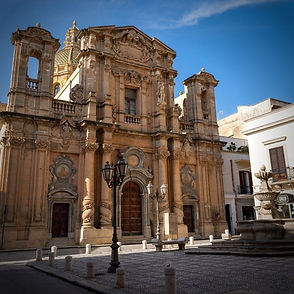
CHIESA DEL PURGATORIO
The building insists on Piazza del Purgatorio, in the center of which stands a monumental eighteenth-century fountain in Baroque style . The former Church of Purgatory, today the auditorium of S. Cecilia, stands in the same place as the previous Church of Santi Fabiano and Sebastiano.
Totally restructured in 1669 and completed in 1710, the church, with its tall and elegant dome and its valuable prospect, represents for the city a moment of favorable architectural balance .
The interior has a basilica plan with three naves with transept, stucco ornaments and eighteenth-century frescoes.
Open every day
from 08 to 12
from 15 to 20
Tel: +39 0923 716295
Via Sebastiano Cammareri S.
Free admission
CHIESA MADRE S. TOMMASO DI CANTERBURY
The church, which has always been used as the Mother Church, is located in the heart of the historic center of the city, overlooking Piazza della Repubblica or Loggia, on via Garibaldi and Garraffa, on Piazza F. Maggio and on Piazza del Purgatorio. It was built in different eras as early as 1176, in place of the primeval cathedral built in the early Christian era and probably destroyed during the Arab invasion .
According to tradition, the dedication to St. Thomas Becket, bishop of Canterbury , dates back to the shipwreck along the Marsala coast of a ship loaded with Corinthian columns destined for a church to be built in England in honor of the saint.
The main façade, in exposed limestone, is embellished with marble portals, the central one with baroque motifs , and the more recent side ones with late Renaissance motifs.
Open every day
from 08 to 12
from 15 to 20
Tel: +39 0923 716295
Republic square
Holy Mass: Holidays
09.00 - 11.30 - 18.00
summer opening hours: 09.00 - 19.00
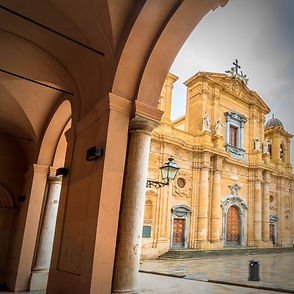
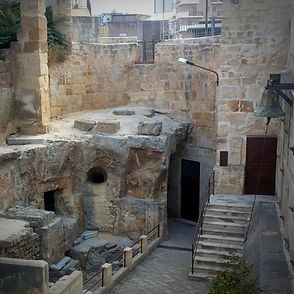
SANTUARIO MADONNA DELLA CAVA
The current sanctuary is only the last place where the statue of the Marsala patroness was kept, exhibited and venerated over the centuries. Three other buildings, in fact, have performed these functions overlapping over time: the first was the cave in which the statuette was found in 1518; the second, the single-nave church built above the crypt in 1607; the third, finally, was the majestic three-nave church built between 1850 and 1859, then razed to the ground on 11 May 1943 during an American bombing.
At the entrance of the ancient cave , with its granite vault and the legendary well in the center, there are traces of one of the oldest monasteries in the world and, under the floor, there are rooms that were used as a cemetery. In recent months, new excavations next to the altar that houses the tabernacle have identified another opening, revealing two more rooms.
CHIESA DELL'ADDOLORATA
The church with a central plan was built in 1691 on the site of a miraculous event , and rebuilt in 1790. It preserves the statue of Our Lady of Sorrows (18th century), much venerated by the population, and which gives life to a participatory and moving procession.
Also called Madonna del Fulmine following a tormenting storm in the winter of 1691 in which all the frightened population took refuge at Porta di Mare, now Porta Garibaldi, to beg the Virgin.
The Church overlooking Piazza dell'Addolorata houses one of the most significant and evocative images of Maria the Addolorata.
Open every day
from 08.30 to 12
from 16 to 19
Tel: +39 0923 713195
Piazza dell'Addolorata n 1
S. Mass: Sunday 11 am
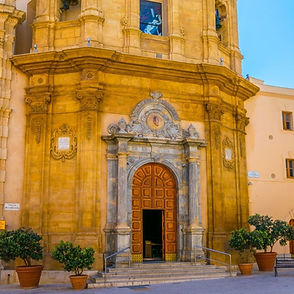
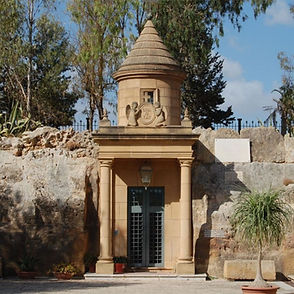
SANTO PADRE DELLE PERRIERE
The sanctuary is located inside a quarry, once used for the extraction of tuff, called "perriera". The place is a destination for pilgrimages and prayers and preserves a half-length statue of San Francesco di Paola.
Originally it was only a small cave dug into the tuff, the construction of a first adjacent church took place in 1866; in 1899 the grotto was embellished with the addition of a dome and a pronaos supported by two columns, and in 1953 it was flanked by a second grotto, today the chapel of the Blessed Sacrament.
The current half-length portrait of San Francesco di Paola, made of tuff covered with stucco, is a copy of the original one, which was destroyed by a fire not long after its location.
Open every Friday
from 08 to 13
from 15.30 to 20.30
Tel: +39 389 0906599
C. from S. Father delle Perriere
S. Mass: Sunday 6 pm
